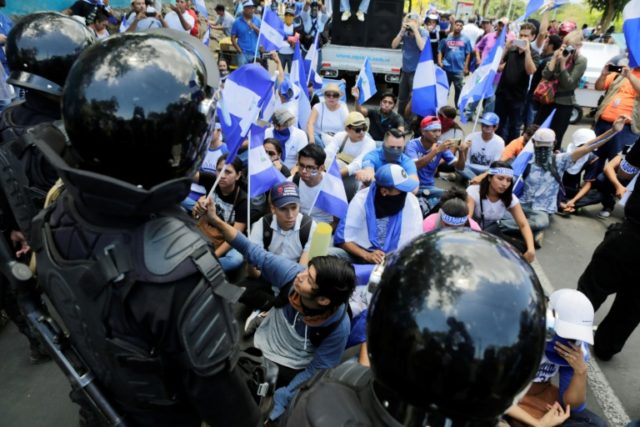Managua (AFP) – Nicaragua’s bishops on Thursday called for dialogue to usher in “real democracy” as weeks of protests against veteran President Daniel Ortega continued, spearheaded by university students.
The appeal by the National Episcopal Conference, read out by Cardinal Leopoldo Brenes in a news conference in the capital Managua, underlined a push to have talks that address deep-seated issues that have made Ortega’s rule over the past 11 years unpalatable for many Nicaraguans.
Protests demanding his ouster erupted April 18, initially triggered by moves to cut back on social security spending.
They quickly spread to encompass a range of grievances against the 72-year-old president seen as increasingly autocratic and sullied by corruption allegations.
The demonstrations were met with robust police action in which at least 45 people died according to a leading rights group, the Nicaraguan Center for Human Rights. Officials stopped updating their toll three days into the protests, when they said 10 people had died.
– Probe into deaths demanded –
Although the protests have become less violent over the past week, they are continuing. Students have called for a nationwide demonstration for Wednesday next week.
Ortega has said he is willing to hold dialogue to calm the situation, but he has not said what topics they would cover nor who would participate.
Brenes, who is archbishop of Managua, has offered to mediate the talks, though there was frustration that no framework had yet been laid down.
The dialogue “should begin as soon as possible,” the bishops’ statement said.
In unusually pointed language it added that the talks “should review Nicaragua’s political system from the roots up to arrive at a real democracy.”
The statement backed students’ demands that the “painful deaths” recorded during the protests be fully investigated.
University students have urged renewed street protests and a national strike, as well as demanding an independent commission be set up to probe the protest deaths. They have given a deadline of next Tuesday for the latter condition to be met.
– Police raid of campus –
A group of students at Managua’s Polytechnic University, the nexus of the protest organization, said on Thursday that police had raided the campus overnight, hurting six students, one of them seriously.
Officers and groups of civilians suspected to be youth sympathizers of Ortega’s ruling party “attacked” the campus at 1 am (0700 GMT), student spokeswoman Scarleth Espinoza said at a news conference.
“The police entered and attacked us along with groups of civilians, possible members of the Young Sandinistas,” associated with Ortega’s ruling party, said another student at the news conference who declined to be identified.
The students said Thursday that “after this attack” they did not see sufficient “security to take part in dialogue.”
The protests are the worst Ortega has faced in the past 11 years, since the leftist former rebel returned to power after a lengthy stint in opposition.
He was previously the country’s leader between 1985 and 1990, after his Sandinista rebels swept to power, and has ruled over Nicaragua for 22 of the past 39 years.
Ortega’s wife and vice president, Rosario Murillo, reiterated to state media that the president was open to talks “at a time and in a way that the bishops decide.”
“Our government is at the full and total disposal to meet the CEN’s (National Episcopal Conference’s) call,” she said.
Government employees, meanwhile, were seen stationed at key road intersections in the capital in a show of support for Ortega.

COMMENTS
Please let us know if you're having issues with commenting.